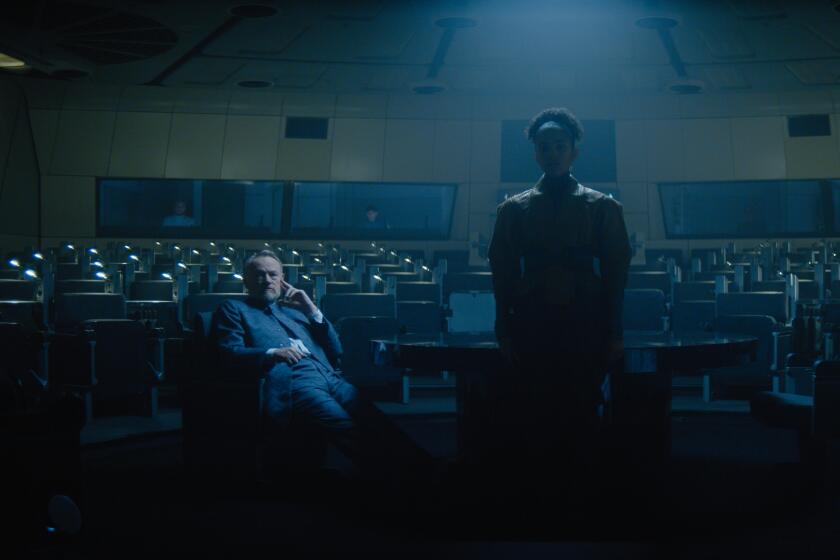He’s been a king, chemist and ad exec. But Jared Harris wouldn’t mind more physical roles, too
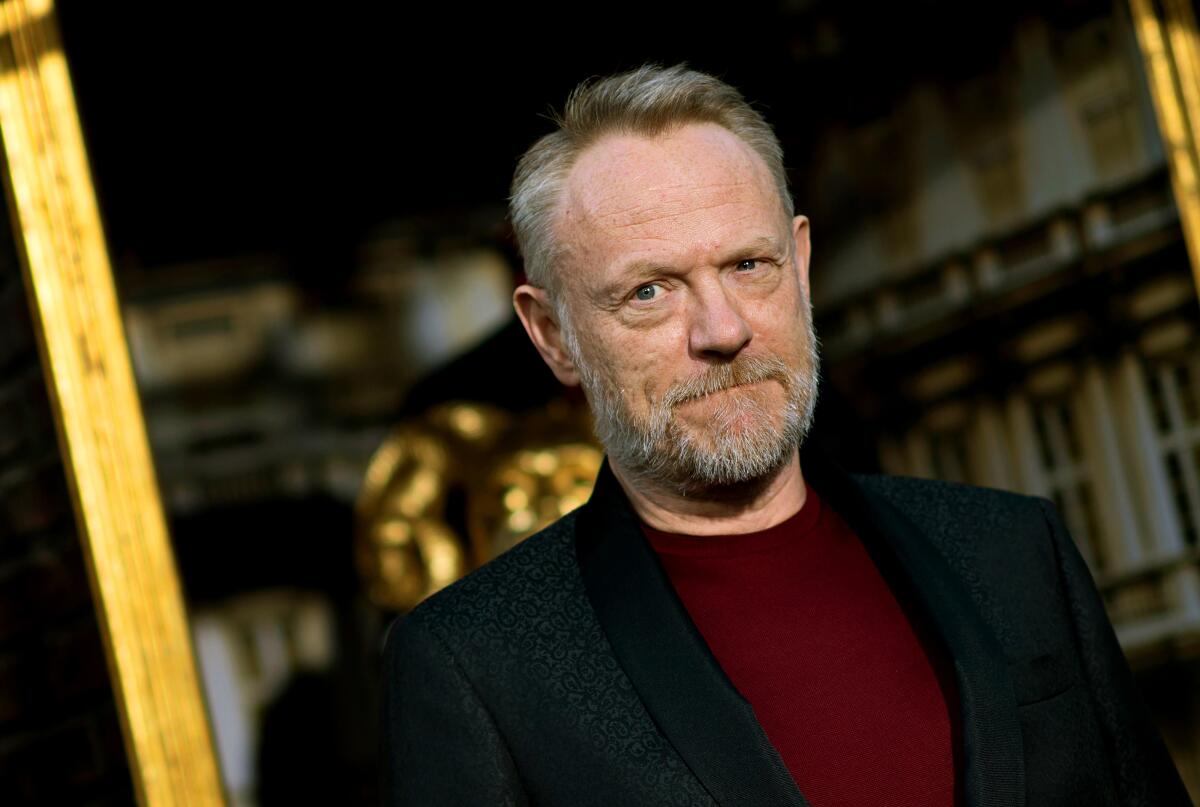
- Share via
The presence of actor Jared Harris in a movie or series is for me a kind of seal of quality, a sign the script was good enough to attract him, the producers smart enough to cast him. But whatever else, for bad things do happen to good actors, I will take every chance to watch him work.
Harris is currently top-billed in Apple TV+’s “Foundation,” liberally adapted from Isaac Asimov’s sci-fi trilogy, whose second season premiered July 14, with new episodes dropping weekly on Fridays. Harris plays Hari Seldon, creator of psychohistory, a mathematical crystal ball that has predicted a coming dark age, and as such he is anathema to the cloned triumvirate who have ruled the galaxy for centuries.
The actor’s earlier television credits include whistleblowing chemist Valery Legasov in “Chernobyl”; a ship’s captain working to keep keep his crew alive in the Arctic horror story “The Terror”; the doomed Lane Pryce in “Mad Men”; the villainous David Robert Jones in “Fringe” and King George VI in “The Crown,” memorably singing Rodgers and Hart with Vanessa Kirby’s Princess Margaret. (Among other real people of history, he’s played Henry VIII, John Lennon, Ulysses S. Grant and Andy Warhol.)
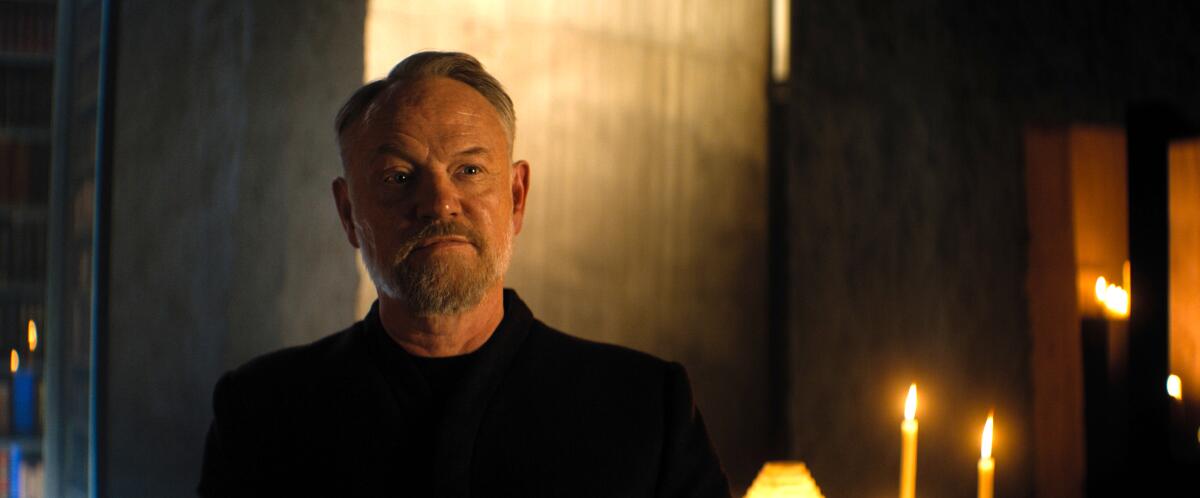
Good, bad or in between, Harris’ characters tend to communicate confidence and capability and a quiet strength that can grow louder when the occasion demands. His speech is musical; its cadence makes you take him seriously. His choices are never obvious.
The British-born Harris spoke with me from his home in Los Angeles on the eve of the actors’ strike. “One keeps reading they’ve acquired a lot of content,” he said of the producers, “a stockpile to keep them afloat. But they need the actors to go out there to promote it, I guess — that’s why we’re doing this today and not tomorrow.” This interview has been edited and condensed for clarity.
Any thoughts on labor in general?
Jared Harris: Listen, there’s no altruism in capitalism, and if you don’t fight for yourself, no one’s going to hand it to you. And they’ll just crush you, say, “Thank you so much.” So I’m all for it. Labor unions get a bad rap in this country, and that’s largely a narrative that’s been put over by the captains of industry. But unions have won a lot of ground for their workers. There’s been, of course, cases of bad management, but the idea behind unions, collective bargaining, is a logical and positive one.
When “Foundation” premiered, I wrote about the way you sat in a chair in one scene, with your legs shot out straight, in a way that seemed completely original for sci-fi.
I had my jacket open as well. I was sort of relaxing, waiting for the next stage of the trial.
In ‘Foundation,’ now on Apple TV+, the ‘Mad Men’ and ‘The Crown’ veteran conveys something elemental about his character — without even standing up.
Is that a conscious construction or something you do by instinct?
Well, it comes as a result of asking questions. The question there is how long have we been waiting. If you’ve been there a long time, you’re going to get to a point where you relax. And there’s a game going on too, ’cause you know they’re trying to sweat you out and you’re not going to play into their hands by nervously waiting. You’re going to go, “Well, we might as well get comfortable.” But one of the questions I had from the very beginning with this character is that he was a sort of a cipher; he didn’t seem human. And the conversations have always been about how do we make him more than just the MacGuffin, because he’s got this sort of magical box that tells the future, but no one really knows how it works. It’s just a box you open and go, “Look, this is what’s going to happen next.”
The way he was initially written reminded me of HAL [the computer from “2001: A Space Odyssey”] ; he had this sort of disembodied, vaguely threatening [quality]. I thought, “He’s got to be a human being.” But it wasn’t, “This is what I’m going to do in that scene.” All those things are in your mind constantly, things you want to address as you approach the material and the actual practical aspects of doing it. You haven’t been taken to the location, don’t know what the set is. You have to wait until you get there and figure out what you can do with it. But everything is an opportunity to tell a story, even just the way you’re sitting in a chair.
A lot of the work is imaginative, but that’s a mental process and eventually it’s got to become a tangible, physical thing. You have to leave your brain behind and trust you’ve done the work you need to do in the preparation — you’re not trying to remember lines, you’ve done all that a long time ago — and now you just properly sit there and quickly try to inhabit the moment.
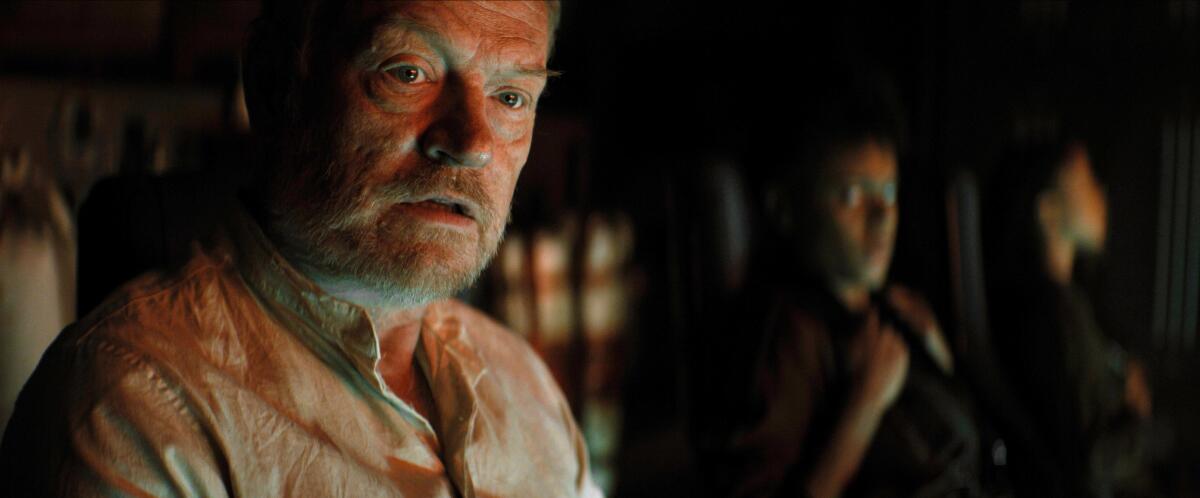
This season you’re running around more, getting dirty.
Yeah, thank God. It’s more physical, which I enjoy. And I’m in it more — [chuckling] couldn’t be in it less. Those are things I find to be great fun. The physical stuff is helpful, because you don’t have to think. You’ve got immediate challenges to deal with. I have a great deal of respect for actors who do action films, because those things are done in tiny little sections, sometimes months apart — it’s a lot more difficult than it looks.
I loved “The Ghost of Richard Harris,” the recent documentary about your actor father. Were there things you learned from it?
Yeah! All that footage of him as a young man down by the seaside in Kilkee [in Ireland], we’d never seen that before. I don’t know where [director Adrian Sibley] found those audio tapes of phone conversations, but they brought back intense memories. He was doing “The Wild Geese,” I remember, down in Tshipise in South Africa, and you’d get this message that your father was on the house master’s telephone. There’d be a couple of minutes of conversation, but our life wasn’t interesting. We were stuck at school going to religious services five times a week, eating bad food, playing sports. We didn’t have a lot to tell him. He’d tell us what was going on with him, but there’d be these long, long silences. But neither of us wanting to hang up. We were just happy to feel each other’s presence for a while.
What did I learn? I hadn’t heard that sort of nihilistic view he had; there’s audio of him talking about how he thinks the world is a great mistake. I sort of understood where it came from, from this massive disappointment he had. He was very Catholic — he couldn’t escape that in his background. But at the same time it was his version he pursued. No one else was allowed to say anything bad about the church, but he himself had great condemnation of it, its failure and its hypocritical nature. And he had great affinity for the underdog, ’cause he perceived himself as having been an underdog most of his career, fighting against the odds.
You became a headliner late, at an age when many actors are on a downhill slope.
It’s true. Perseverance! Honestly, probably the biggest shift was “The Crown.” There’s a lot to be said for being on the right side of the argument in a story. A lot of the time you’re playing antagonists and trying to create an interest in your character that — you know, they’re grateful to you for doing it, but they don’t want you to do it too well, because you’ll start to shift the balance. And the way Hollywood constructs stories, they’re designed essentially around one person who’s the star, and you’re either helping that person achieve the goal or frustrating that person from achieving the goal. In that particular case, I was playing the character who was on the right side of that equation. It means a lot, for a story to be working in your favor.
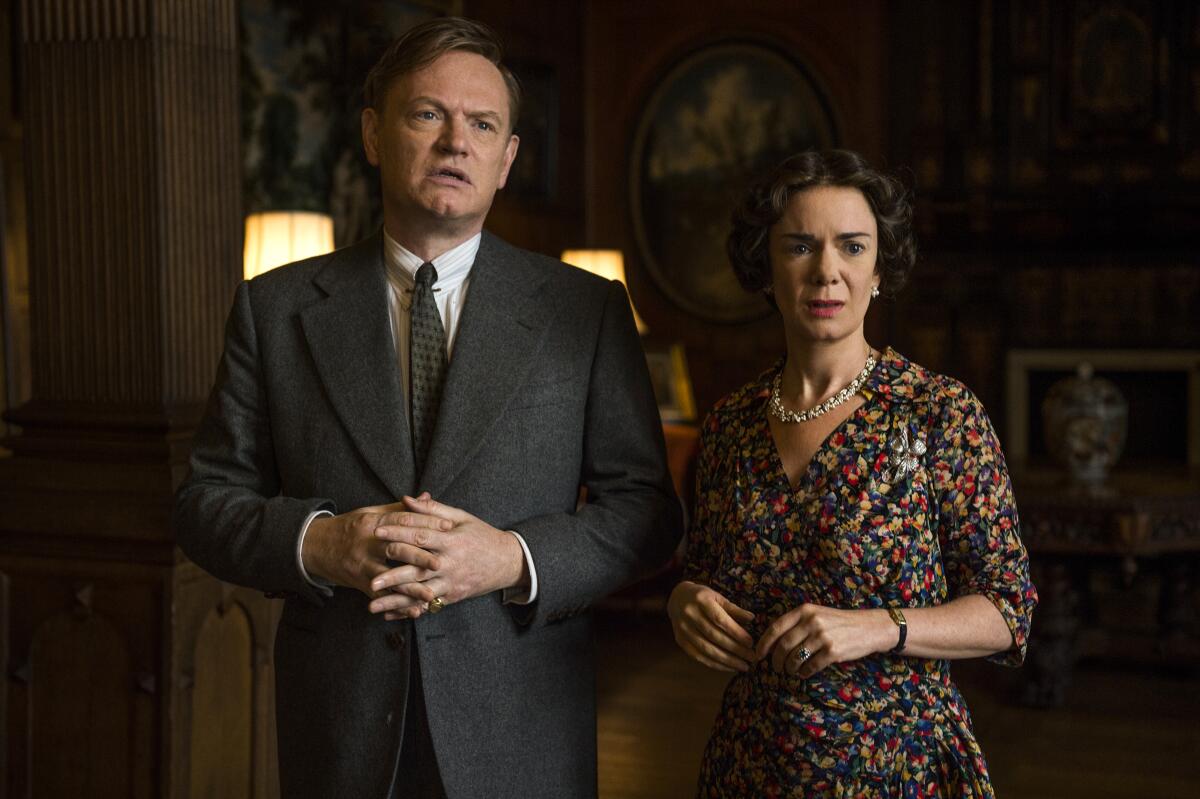
Still, there’s a dignity I find in both your heroes and villains — you can see their argument.
If you’re in the hands of a good writer, they’ve fully inhabited the world of every character. You’re the lead of your own life, and every human being approaches life that way. That’s one of the things I thought Dave Kajganich did so well in “The Terror.” And quite often, that’s not the case. More often than not, they’re just focused on the main characters, so you have to provide all that yourself. And sometimes that means you need to do a little bit of rewriting, ad-libbing.
Do you craft lines to sound more melodically?
Not consciously. But I think editing is a very good thing to do, ’cause quite often things are overwritten, and also, the part that’s unsaid is often the bit that’s interesting. And quite often writers write dialogue as though it were literature, the way it would appear on a page, and we don’t talk that way. So I try to colloquialize my dialogue. Of course you weren’t allowed to do that on “Mad Men.” On my first day on set on “Mad Men,” I had to do another take because I’d left out an apostrophe.
An apostrophe?
I said “It is,” rather than “It’s.”
You and your brothers [director Damian, actor Jamie] all wound up in show business. Do you feel that was a genetic inevitably, or perhaps a family curse?
Depending on whether you’ve got a job, it’s a curse or not. Yes, both my parents were actors. My mother [Elizabeth Rees-Williams] had to stop when she was 25 ’cause she had three kids and a husband who wasn’t going to stay at home to look after them; he was pursuing his career — which was what men were supposed to do back then. It’s also to do with conversations you have around the dinner table, and people who were there quite often were other actors, writers, directors — people who worked in show business in some way. It was always part of the conversation. On the other hand, we weren’t excellent enough in our academics to really do anything else.
Were your parents supportive?
Not initially. I was very shy, and my father didn’t think I was suited for it.
It was at Duke University that I started to do plays, and my mother came down and saw me in “Equus.” I played the father, and that sort of brought her on board. And my father refused to come down because he thought I was going to be embarrassing. My mother said, “No, he’s actually quite good,” and dad said, “You would say that, you’re his mother.” It wasn’t until I’d actually graduated from Duke and had stayed behind to do “Entertaining Mr Sloane” — I’d [directed] a movie when I was at Duke as well, a really terrible pretentious thing called “Darkmoor,” and he saw the film in the afternoon and the play in the evening. And he said he’d come down to tell me to go to film school and be a director; he’d already made his mind up.
But four, five minutes into the play, I heard him laugh, and I’ve never forgotten that feeling. Our entire relationship changed. There was such excitement on his face afterward; I came out of the the stage door to meet him to go out for dinner, and he was absolutely thrilled. And a whole new avenue of conversation opened up because obviously this was something he was passionate about. He would describe performances he’d seen in detail and reenact moments of plays that had stuck in his mind. “Hamlet” was a big conversation piece between us. It was a part he was fascinated by and had never done.
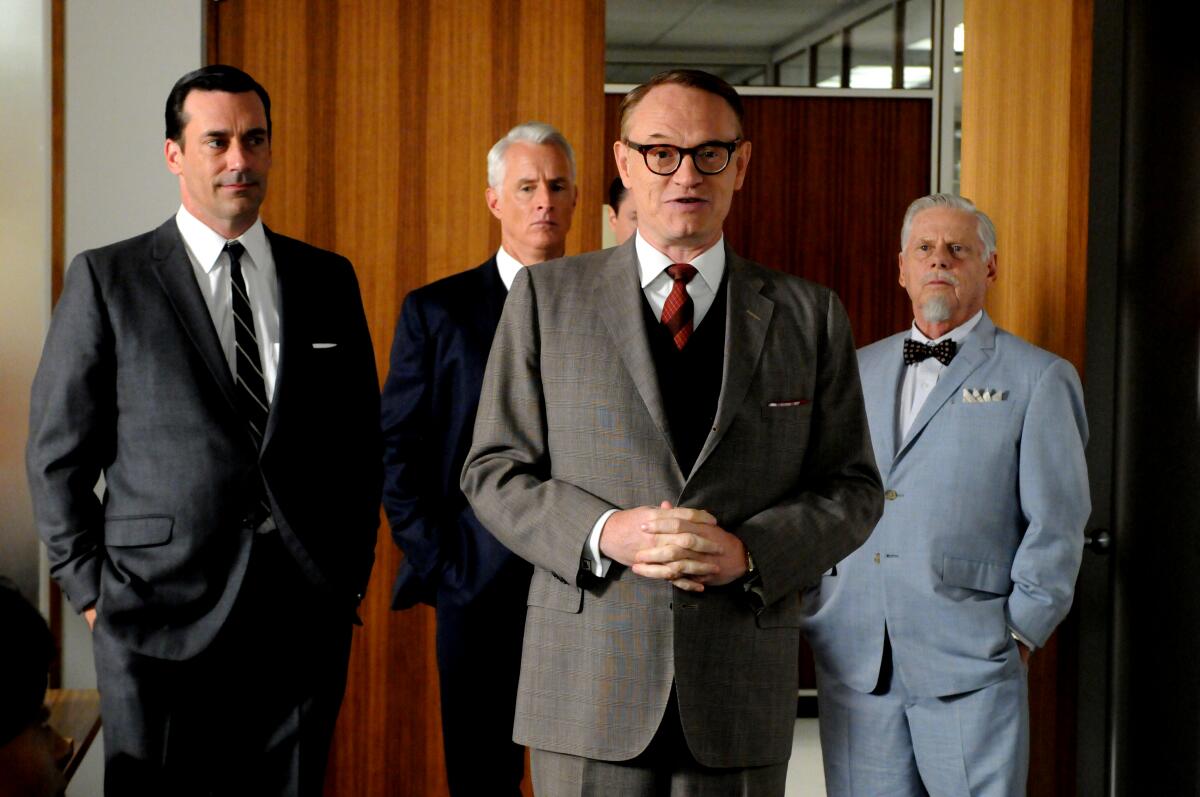
You played Hamlet.
I did. And he played the Ghost [integrated into the play on film]. Our idea didn’t quite work, but still I learned a lot watching him every night. Just the very specific detail and thought process behind and involved in every line. The Ghost has that big speech, so I’d have my back to the audience watching it, and I would get lost in it often because every night I’d notice something different about a choice he’d make.
Are there specific things in your toolbox you got from him?
Never sign a contract you haven’t read. That’s helped me a lot. But acting-wise, he prepared really thoroughly, and I’ve got his scripts, covered with notes; he enjoyed that whole part of it. I haven’t put this together before, but he was interested in the entire story, not just his part, and how, if you understand the whole story, you understand how your role fits into what it’s trying to tell. And that’s really important, [because then] you can have useful conversations with the directors and the writers. ’Cause they’re trying to solve the same problem. You can help them.
Why did you go to Duke?
This is really ironic — I fulfilled their diversity quota. Can you imagine anything crazier than that? They had a certain number of foreign students they had to admit each year, and I ticked that box. I applied to all the obvious ones, didn’t get into them, but I got into Duke. I was, in hindsight, very happy that it worked out that way, because I had a very skewed idea of America. I’d been to New York and Los Angeles with my parents and to my mind that’s what America was, and obviously it isn’t. You only have to go to Queens to know that America’s not New York. So, it was really eye opening. And then lucky for me — if I’d gone to a school with a proper theater and acting department, you know, there’s 500 students trying to get five roles. So there wasn’t a lot of competition in that department — I could walk in on a whim with no experience at all.
What mark did North Carolina make on you?
There are things about it I really loved. You’re properly in the South, and you could see that very clearly. There were a lot of strange paradoxes living side by side. On Main Street, there was, like, a gay and lesbian bookshop right next door to the gun shop. And customers never went into both. Even if you look at Duke itself, [founded by] a family that made its money on tobacco and [is] now the leading research university for cancer. There were a lot of interesting little ironies and twists about the place. And something I hadn’t experienced before, Black Americans and white Americans not mixing; that hadn’t been my experience at school in England. And the best music clubs and dance clubs.
A great time for music there.
Yeah! Great acts came to Duke. Nina Simone, saw her there, English Beat, Joe Jackson, just fantastic — Elvis Costello, the Clash, James Brown, Willie Nelson, Prince. I saw Iggy Pop; I think it was at the Cat’s Cradle in Chapel Hill. I worked with him later on “Dead Man” and told him I’d caught his tour. And he knew exactly — [excited Iggy Pop voice], “Oh yeah! That was the gold lamé boxer shorts tour!” He wore wore gold lamé boxer shorts and nothing else. By the time we did “Dead Man” together, he was completely clean and sober and doing tai chi every morning at, like, 6 o’clock. Very funny, very down to earth. A lovely man.
Are there kinds of shows or movies you haven’t been asked to do you’d be interested in doing?
I’m fascinated with ancient Greek history, so I’ve always wanted to be in one of those “300 Spartans” or “Gladiator” type things. I love sword fighting; I also was a boxer from a very young age, so I‘ve wanted to play that kind of character. Then there’s archetypes of films that I grew up watching. Emily Watson and I were on our first scene together on “Chernobyl” and for some reason, there was a map on the table, and we immediately devolved into World War II movie acting — “Jerry’s over here, and we’re here” — just messing around.” “I want to be in one of those.” “Me too!”
But not, like, a family sitcom or a rom-com?
I always try to find the humor in things and squeeze it in. One of the conversations I had with [“Chernobyl” creator] Craig Mazin, I said, “The Russians have a fantastic sense of humor, incredibly dark,” and I wanted a couple of jokes. He said, “Not for you. No jokes for you.”
More to Read
The complete guide to home viewing
Get Screen Gab for everything about the TV shows and streaming movies everyone’s talking about.
You may occasionally receive promotional content from the Los Angeles Times.
